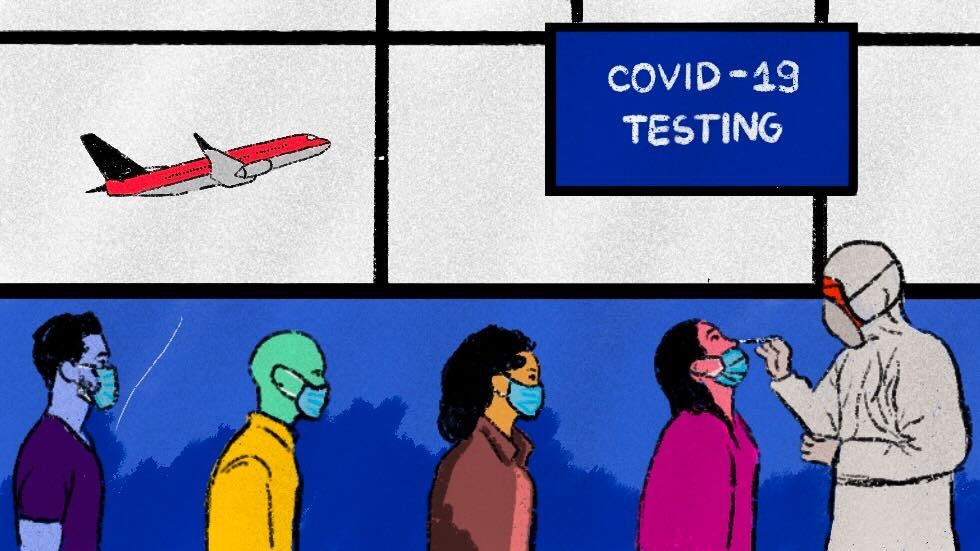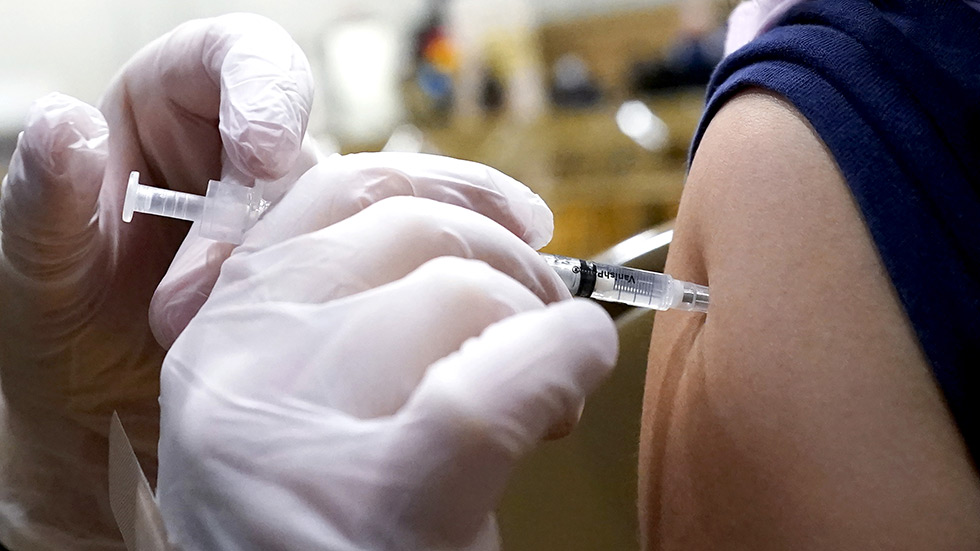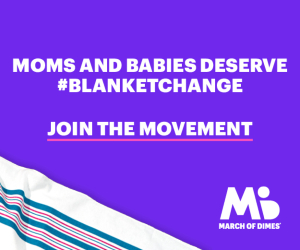Overnight Health Care — Presented by March of Dimes — Biden’s winter COVID-19 strategy

Welcome to Thursday’s Overnight Health Care, where we’re following the latest moves on policy and news affecting your health. Subscribe here: digital-release.thehill.com/newsletter-signup.
Two weeks after dropping the city’s mask mandate, D.C. officials announced a mask advisory suggesting everyone wear face coverings in indoor public settings as the U.S. confirmed two more cases associated with the omicron variant.
President Biden announced new steps to fight COVID-19 while the second and third known U.S. omicron cases were confirmed.
For The Hill, we’re Peter Sullivan (psullivan@digital-release.thehill.com), Nathaniel Weixel (nweixel@digital-release.thehill.com) and Justine Coleman (jcoleman@digital-release.thehill.com). Write to us with tips and feedback, and follow us on Twitter: @PeterSullivan4, @NateWeixel and @JustineColeman8.
Let’s get started.
White House details next COVID-19 steps

President Biden on Thursday outlined a multi-pronged plan his administration will implement to fight COVID-19 in the winter months that includes an expansion of at-home diagnostic tests, stricter testing rules for international travelers and new efforts to encourage vaccines and boosters.
The steps come as at least three cases of the omicron variant have been found in the U.S. and while the delta variant continues to cause some of the worst spikes of the pandemic, especially in unvaccinated areas of the country.
The surge of infections and presence of a new and largely unknown variant represent the latest threat to the nation’s public health, the economy and Biden’s political standing in the wake of sinking approval ratings and ahead of next year’s midterm elections.
During a speech at the National Institutes of Health, the president sought to brace the public for a rise in COVID-19 cases this winter, urging those eligible to get their vaccine booster shots even as he showed optimism about the country’s continued efforts against the virus.
“My plan I am announcing today pulls no punches in the fight against COVID-19 and it’s a plan that I think should unite us,” Biden said. “I know COVID-19 has been very divisive in this country. It’s become a political issue, which is a sad, sad, commentary. It shouldn’t be.”
Using existing strategy: Some elements of the administration’s plan were new; a stricter testing policy for international air travelers, family vaccination clinics, and a plan to have private insurance reimburse at-home COVID-19 tests. But largely, the administration is not putting more restrictions or mandates in place and instead is encouraging people to get vaccinated and get booster shots.
Health experts and administration officials say the current vaccines are the best weapon against any variant, and there’s no reason to believe the shots won’t be at least effective against severe disease from omicron.
“While my existing federal vaccination requirements are being reviewed by the courts, this plan does not expand or add to those mandates,” Biden said, calling it “a plan that all Americans can hopefully rally around.”
A MESSAGE FROM MARCH OF DIMES
The U.S. remains among the most dangerous developed nations for childbirth. Help prioritize the health of our nation’s moms and babies by joining the #BlanketChange movement today at BlanketChange.org.
US confirms more omicron cases

Minnesota and Colorado confirmed the country’s second and third COVID-19 cases involving the omicron strain, one day after the Centers for Disease Control and Prevention (CDC) identified the first in California.
The second was detected in someone from Minnesota, whose only recent travel had been to a convention in New York City. He developed symptoms on Nov. 22, a full week before the travel ban took effect, an indicator that the strain was already circulating in the U.S.
The third was found in Colorado, in a person who traveled throughout Africa and returned to the U.S. late last week.
All three individuals were fully vaccinated and endured only mild symptoms.
“While this is clearly something to take seriously … it is not a reason to panic,” Minnesota Health Commissioner Jan Malcolm said during a press conference.
Though no cases of omicron have been confirmed in New York, New York City Mayor Bill de Blasio (D) said on Thursday that people should assume the variant is already present in the city.
Important to note: Since omicron’s emergence, health experts have stated that it is still unclear how well the strain evades immunity offered by currently available COVID-19 vaccines. Numerous vaccine developers have hypothesized that oral COVID-19 treatments and booster shots should be effective against the variant.
WHITE HOUSE STILL DEFENDING TRAVEL BAN
The White House on Thursday said there is no timetable for lifting travel restrictions on southern African countries, even as two new cases of the omicron variant were identified in the U.S.
Press secretary Jen Psaki defended the ban to reporters, saying President Biden was following the advice of public health experts who were concerned about large numbers of cases stemming from an unknown variant.
“I wouldn’t anticipate the lifting of restrictions before we know more about the variant,” she said. “None of these are meant to be permanent, none of them are meant to be a punishment, they’re all put in place to protect the American people to hopefully save more lives.”
But the new cases demonstrate that there is at least some local transmission of the variant and that it had arrived in the U.S. before the Biden administration imposed travel restrictions on eight African countries, including Botswana and South Africa where early cases of the variant were detected.
The ban took effect on Monday. But even at that point, the variant had been found in more than a dozen countries, including some in Europe, which were not affected by the ban.
The ban also doesn’t apply to U.S. citizens or permanent residents, only foreign nationals.
A MESSAGE FROM MARCH OF DIMES
The U.S. remains among the most dangerous developed nations for childbirth. Help prioritize the health of our nation’s moms and babies by joining the #BlanketChange movement today at BlanketChange.org.
GOP sets back Biden’s vaccine mandates

The GOP’s legal pushback against President Biden’s vaccine mandates is limiting his efforts to get more people vaccinated in the face of the omicron variant.
A string of recent court rulings have halted both Biden’s vaccine-or-test mandate for workers at businesses with 100 or more employees and his vaccine mandate for health workers.
Republican state officials have backed both court challenges and celebrated the recent rulings in their favor, arguing Biden’s mandates exceed his authority and infringe on people’s freedom to make health decisions for themselves. Some GOP lawmakers are even pushing to block a government funding deal unless it defunds Biden’s vaccine mandates.
But especially at a time when the new omicron variant potentially poses a heightened threat, many health experts say mandates are a key tool in getting more people vaccinated to tame the pandemic and worry about the effects of efforts to fight them.
“These efforts are both irresponsible and they’re serving as a barrier to getting people vaccinated,” said Georges Benjamin, executive director of the American Public Health Association.
Thirty deans of public health schools, among other experts, filed a court brief this week in support of Biden’s vaccine-or-test mandate for workers, citing the omicron variant.
BOOSTER NUMBERS JUMP
The percentage of adults vaccinated against COVID-19 who have gotten their booster more than doubled in November in a “significant uptake,” a Kaiser Family Foundation (KFF) poll found, as the U.S. expanded eligibility to the extra dose.
The KFF Vaccine Monitor for November released Thursday found 23 percent of vaccinated adults said they have had their booster shot, compared to 10 percent who said the same in October.
While a majority of the vaccinated adults — 56 percent — said they are likely to get their booster once eligible, 18 percent said they will probably or definitely not get a booster dose.
Little change among unvaccinated: Meanwhile, the poll found no “significant” progress in the percentage of vaccinated adults since September, with 73 percent saying they have gotten the first shot.
This comes as experts have repeatedly said the U.S. cannot “boost” its way out of the pandemic and instead needs more unvaccinated people to get their initial round of shots.
Boosters officially became available to all adults at the tail end of the survey period on Nov. 19. But the emergence of the omicron variant was first reported last week, prompting the CDC to recommend boosters for all adults on Monday.
WHAT WE’RE READING
- Hospitals refused to give patients ivermectin. Lockdowns and political pressure followed. (Kaiser Health News)
- Variants, boosters turn rich-poor vaccine gap into chasm (The Associated Press)
- Califf, nominee to lead FDA, asks Woodcock to stay in leadership role if he’s confirmed (Stat News)
STATE BY STATE
- Missouri health department found mask mandates work, but didn’t make findings public (Missouri Independent)
- Maryland takes step to end school mask mandate and let school systems decide (Washington Post)
- People can’t get Covid boosters in Maine because of staffing woes at drugstores (Bloomberg)
OP-EDS IN THE HILL
- It’s no longer a luxury to treat rare diseases — we must act accordingly
- States shouldn’t push Americans off the telehealth cliff
- When politics trump workers’ health, we know who gets burned
That’s it for today, thanks for reading. Check out The Hill’s health care page for the latest news and coverage. See you Friday.{mosads}
Copyright 2023 Nexstar Media Inc. All rights reserved. This material may not be published, broadcast, rewritten, or redistributed.


